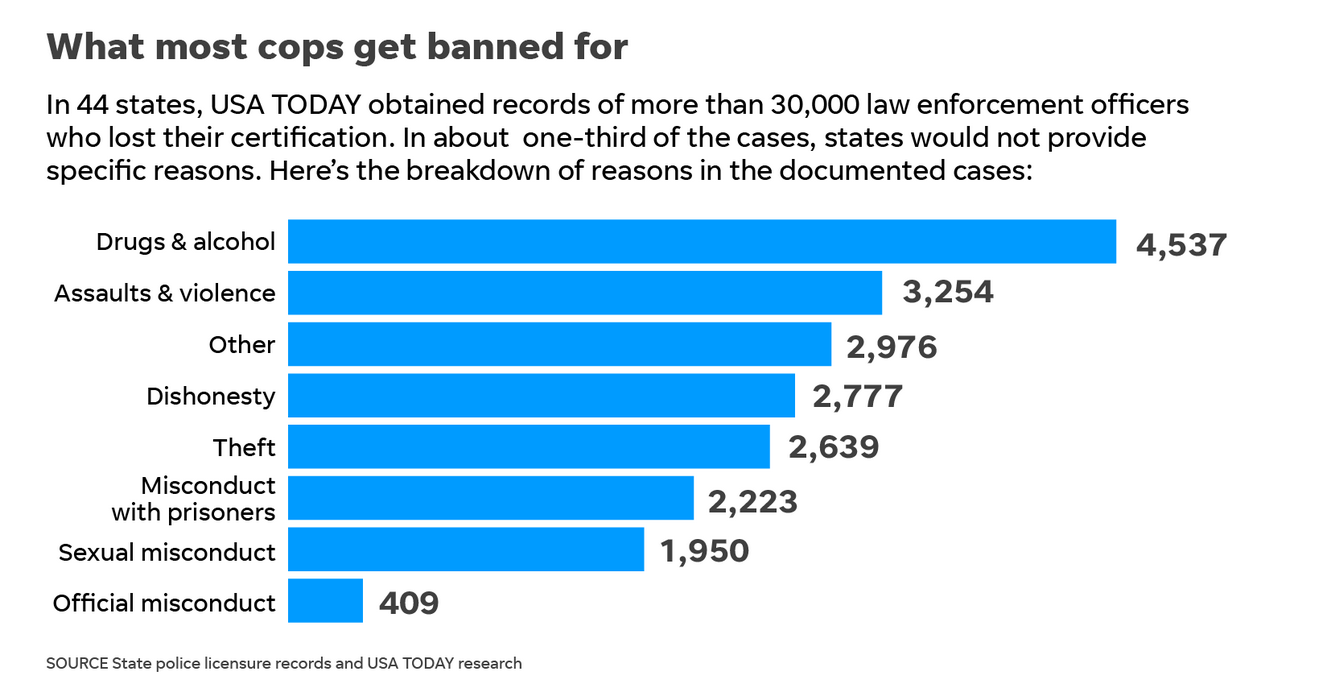The trust between law enforcement and the public is a delicate bond, one that is essential for the fabric of a just and orderly society. However, like any powerful institution, the potential for abuse and misconduct exists, and when the guardians of law become its violators, the very foundation of justice is shaken.
It's a story as old as the institution of policing itself, but recent investigations, like that undertaken by USA Today, cast a modern spotlight on the problem. They reveal a troubling landscape of misconduct and a culture of silence that, if left unaddressed, threatens to undermine public trust irreparably.
A Systemic Issue
For decades, the topic of police misconduct has been a contentious issue in America. But only recently, thanks to the diligent efforts of investigative journalism, have we been given a clearer picture of the scale of "dirty cops" within the system. The 2019 investigation by USA Today brought to light thousands of previously unacknowledged instances of officer misconduct.
The findings were staggering; officers who lied, stole, dealt drugs, drove drunk, and abused their spouses, among other offenses, were not only escaping the consequences but were also continuing to serve. In some cases, they were allowed to resign quietly, a move that permits the cycle to continue as they often find employment in other jurisdictions.
The Culture of Silence
One of the most insidious elements uncovered is the veil of silence that hangs over law enforcement agencies. Whistleblowers are often ostracized or penalized, and the 'blue wall of silence' is not just a myth—it's an operational reality in many departments. It fosters an environment where misconduct can thrive unchecked and makes it exceedingly difficult to expose and rectify wrongdoing.
The implications of this culture are profound. It not only permits the continuation of individual misconduct but also suggests a structural problem within the policing system that allows, and at times encourages, unethical behavior.
Impacts and Outcomes
The consequences of police misconduct are vast and varied, affecting not just the victims but also the community at large. It erodes public trust, which is critical for effective law enforcement. Communities that don't trust their police are less likely to cooperate in investigations, report crimes, or testify in court. This breakdown in cooperation makes communities less safe and impedes the justice system's ability to function.
Moreover, the cost of misconduct can be measured in dollars and cents as well—cities spend millions in settlements and legal fees each year, draining public resources that could be better spent on community services or proactive policing initiatives.
Moving Forward: Accountability and Reform
The way forward is paved with the stones of accountability and reform. Calls for increased transparency in police departments, along with the establishment of more robust civilian oversight, are growing louder. Technological tools such as body cameras have been widely suggested to provide objective oversight of police activities.
Reform must also focus on training and recruitment. It’s crucial to not only weed out those unfit for service but also to instill a culture that upholds ethical behavior and punishes misconduct. Departments across the country are implementing new training protocols that emphasize de-escalation techniques, community engagement, and recognizing and rooting out implicit biases.
The Role of the Community and Media
Communities play a pivotal role in demanding and enacting change. Being informed, voting in local elections, and participating in civilian review boards are ways in which citizens can influence how they are policed.
The media, meanwhile, remains a powerful force in highlighting issues of police misconduct. Investigations like the one from USA Today provide a crucial service, pulling back the curtain on the hidden problems within law enforcement. Such reporting holds those in power accountable, reminding them that the eyes of the public are ever-watchful.
In Conclusion
The issue of "dirty cops" is more than a series of isolated incidents—it is a challenge to the integrity of American law enforcement. As disheartening as these revelations may be, they also offer an opportunity for genuine change. By confronting these truths, society can work toward a vision of policing that truly serves and protects all citizens, thus strengthening the bond of trust upon which the law must stand. The journey will be long and arduous, but it is a necessary one if America is to live up to the ideals of justice and equality it so proudly proclaims.

https://www.bbc.com/news/world-us-canada-43035628
https://www.aclu.org/issues/criminal-law-reform/reforming-police/police-corruption

Dirty Cops in America: Uncovering the Veil of Blue Misconduct